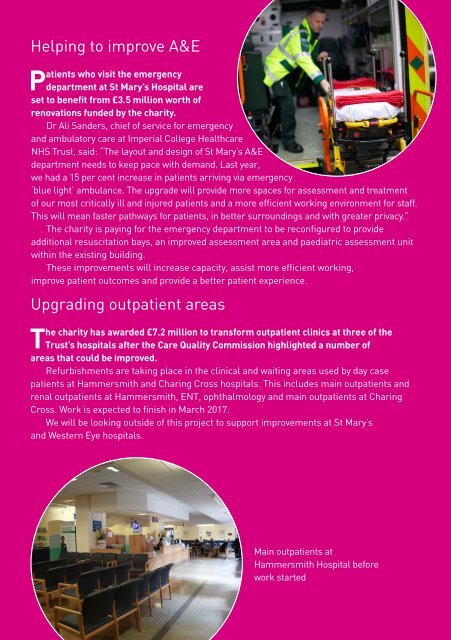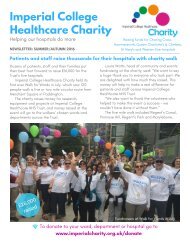Imperial College Healthcare Charity Impact report 2015/2016
This report highlights some of Imperial College Healthcare Charity's achievements during the year, and in particular focuses on the real difference we have made to patients, families, visitors and staff in and around the five hospitals we support. The figures speak for themselves - over £12 million in grant funding to more than 100 projects, nearly £500,000 supporting research, and £55,000 directly to patients and families in real financial need through our 'Dresden Fund' grants.
This report highlights some of Imperial College Healthcare Charity's achievements during the year, and in particular focuses on the real difference we have made to patients, families, visitors and staff in and around the five hospitals we support. The figures speak for themselves - over £12 million in grant funding to more than 100 projects, nearly £500,000 supporting research, and £55,000 directly to patients and families in real financial need through our 'Dresden Fund' grants.
You also want an ePaper? Increase the reach of your titles
YUMPU automatically turns print PDFs into web optimized ePapers that Google loves.
Helping to improve A&E<br />
Patients who visit the emergency<br />
department at St Mary’s Hospital are<br />
set to benefit from £3.5 million worth of<br />
renovations funded by the charity.<br />
Dr Ali Sanders, chief of service for emergency<br />
and ambulatory care at <strong>Imperial</strong> <strong>College</strong> <strong>Healthcare</strong><br />
NHS Trust, said: “The layout and design of St Mary’s A&E<br />
department needs to keep pace with demand. Last year,<br />
we had a 15 per cent increase in patients arriving via emergency<br />
‘blue light’ ambulance. The upgrade will provide more spaces for assessment and treatment<br />
of our most critically ill and injured patients and a more efficient working environment for staff.<br />
This will mean faster pathways for patients, in better surroundings and with greater privacy.”<br />
The charity is paying for the emergency department to be reconfigured to provide<br />
additional resuscitation bays, an improved assessment area and paediatric assessment unit<br />
within the existing building.<br />
These improvements will increase capacity, assist more efficient working,<br />
improve patient outcomes and provide a better patient experience.<br />
Upgrading outpatient areas<br />
The charity has awarded £7.2 million to transform outpatient clinics at three of the<br />
Trust’s hospitals after the Care Quality Commission highlighted a number of<br />
areas that could be improved.<br />
Refurbishments are taking place in the clinical and waiting areas used by day case<br />
patients at Hammersmith and Charing Cross hospitals. This includes main outpatients and<br />
renal outpatients at Hammersmith, ENT, ophthalmology and main outpatients at Charing<br />
Cross. Work is expected to finish in March 2017.<br />
We will be looking outside of this project to support improvements at St Mary’s<br />
and Western Eye hospitals.<br />
Main outpatients at<br />
Hammersmith Hospital before<br />
work started<br />
Redeveloping Riverside Theatres<br />
The Riverside Operating Theatres at Charing Cross Hospital are set to be redeveloped<br />
thanks to a £1 million grant from the charity.<br />
The Riverside Theatres are currently outdated but these<br />
improvements will produce the full set of facilities required<br />
for elective short stay surgery in one unit: waiting area;<br />
patient consent rooms; four theatres compliant<br />
with modern air handling requirements; recovery;<br />
improved changing rooms and quiet room for<br />
patients; and improved storage to maximize the<br />
use of the theatre facility.<br />
Helping doctors in the fight<br />
against antimicrobial resistance<br />
multiplatform application is set to make it easier for doctors to check Public<br />
A Health England (PHE) guidelines when prescribing antimicrobials such as antibiotics<br />
and antifungals.<br />
The charity awarded funding to develop a Point Of Care Antimicrobial Stewardship Tool,<br />
known as POCAST, which can be used on a desktop or mobile device and will be kept up-todate<br />
with the latest PHE advice. Professor Alison Holmes, director of infection prevention and<br />
control at <strong>Imperial</strong> <strong>College</strong> <strong>Healthcare</strong> NHS Trust, said: “Antimicrobial management is a key<br />
aspect of patient safety and of clinical care. Appropriate prescribing is essential for successful<br />
treatment and to prevent unwanted consequences of toxicity, Clostridium difficile-associated<br />
disease and antimicrobial resistance. The bulk of antimicrobials are prescribed in the<br />
community and antimicrobials are often prescribed inappropriately. Research has shown that<br />
providing doctors with access to antimicrobial prescribing data, together with patient education,<br />
can reduce antimicrobial prescriptions, saving the NHS money.<br />
“We are working with doctors in the community to ensure effective antimicrobial use across<br />
the whole patient care pathway, not just in hospitals. With GPs and primary care prescribers<br />
working together with Public Health England, we can really tackle the problem of AMR.”<br />
24 IMPERIAL COLLEGE HEALTHCARE CHARITY IMPACT REPORT <strong>2015</strong>/<strong>2016</strong> IMPERIAL COLLEGE HEALTHCARE CHARITY IMPACT REPORT <strong>2015</strong>/<strong>2016</strong> 25




